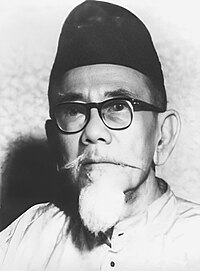Agus Salim
| Agus Salim | |
|---|---|
 |
|
| 3rd Foreign Minister of Indonesia | |
|
In office July 3, 1947 – December 20, 1949 |
|
| President | Sukarno |
| Preceded by | Sutan Syahrir |
| Succeeded by | Mohammad Roem |
| Personal details | |
| Born |
October 8, 1884 Kota Gadang, Agam, West Sumatra, Dutch East Indies |
| Died | November 4, 1954 (aged 70) Jakarta, Indonesia |
| Resting place | Kalibata Heroes Cemetery, Jakarta |
| Nationality | Indonesia |
| Profession | Journalist, diplomat |
| Religion | Islam |
Haji Agus Salim ([ˈaɡʊs ˈsalɪm]; born Musyudul Haq; 8 October 1884 – 4 November 1954) was one of Indonesia's founding fathers and prominent diplomats. He played a leading role in the creation of the Indonesian constitution in 1945 and served as Indonesia's Foreign Minister between 1947 and 1949.
Salim was born in Kota Gadang, Agam, West Sumatra to Sutan Muhammad Salim, a court official, and Siti Zaenab on 8 October 1884. His birth name was Musyudul Haq; Agus was his nickname. His father was a prosecutor (called hoofd djaksa) in Riau High Court and once received the highest civilian medal from Queen Wilhelmina.
In 1890, he began to study in Europeese Lagere School (generally only for Europeans) and graduated in 1897. During that period, he also furthered his studies of Islam. In 1897, he studied at Hogere Burger School and he earned the highest rank of HBS, when he was 19 years old.
Salim was interested in studying medicine applied for a scholarship from the Dutch colonial government, but was refused. In respect of his mother's last wish, at the age of 22 he took a job at the Dutch consulate in Jeddah, Saudi Arabia. His family expected him to study religious science from his uncle, Syaikh Ahmad Khatib. At the embassy, Salim translated and managed Indonesian's hajj pilgrimages.
In 1915, he joined Sarekat Islam under Tjokroaminoto's leadership and soon became second in command; Salim and Tjokorminoto became known as the dwi tunggal (English: the two who are one) due to their close cooperation. Salim later replaced Tjokroaminoto after Tjokrominoto's death in 1934.
In his hometown he opened a public school for native Indonesians, or Hollandsch Inlandsche School. Three years later, he worked as translator for the Landsdrukkerij in Batavia. In 1917 he also worked as Editor in Chief for the Neradja, and then as chief editor at Balai Pustaka. From 1917-1919, he became director of Bataviaasch Nieuwsblad, a Dutch-language newspaper.
...
Wikipedia
